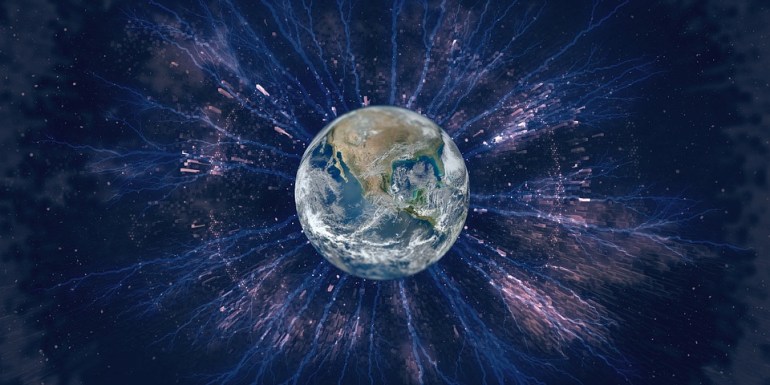The Earth rotates steadily and takes 23 hours 56 minutes and 4.09 seconds to fully rotate around its axis, and the maximum rotation speed at the equator is 1770 km / h, while it is almost non-existent at the poles.
But have you ever thought about what would happen if the Earth suddenly stopped spinning?
In a report published on Live Science on July 24, James Zimpelman, chief geologist emeritus at the Smithsonian National Air and Space Museum in Washington, DC, described the idea of the Earth suddenly stopping rotation as "just a thought experiment."
"There is no natural force that would prevent the Earth from spinning; that's part of the reason for the planet's existence," Zimpelman added. "The Earth has always been in a state of rotation since its inception, which is impressive."
Objects rotate around themselves due to the law of conservation of rotational momentum or the so-called angular momentum (pixabay)
Why does the earth rotate around itself?
Objects rotate around themselves due to the law of conservation of rotational momentum, or the so-called angular momentum.
It is known that the force of gravity affects the mass of the Earth equally from all directions, which gives the Earth its round shape and creates a moment of inertia that causes the Earth to rotate around itself.
Thus, it can be said that the Earth rotates on its axis since its inception.
The rotation of the Earth around itself is affected by the gravitational force generated by the Moon, which causes the Earth's rotational speed to slow down by 1 mm/sec annually.
The sudden stopping of the earth does not mean the lack of rotational momentum (Pixabay)
tearing up the earth's surface
Zimpelman believes that the sudden stopping of the Earth does not mean the lack of rotational momentum or the so-called angular momentum at the equator, as this angular momentum transmitted to air, water and even rocks along the equator will continue to move at this speed of 1770 km / h
This movement leads to tearing the Earth's surface into fragments, which, in turn, fly to the upper layers of the atmosphere, and then are scattered into outer space.
All is not lost, however, if the Earth stops rotating.
The sudden stop of rotation would cause most of the water on the Earth's surface to evaporate (Shutterstock)
Re-assemble and reassemble
Zimpelman believes that the pieces that broke off from the surface will regain some of their rotational ability as the Earth continues to spin and the tattered remains in their path around the sun.
Eventually, the shards' aura will be pulled back together by Earth's gravitational force, and the molten shards will then stick together in a process called fusion.
According to Zimpelman, the sudden stop of the rotation would cause most of the water on the planet's surface to evaporate.
Although most of the evaporated water will be lost, some of it can be incorporated into new solid minerals such as olivine.
Finally, not all the flying fragments will be collected in the fusion process, as some of them will collide with the Moon due to the Moon's gravity, which will result in countless craters on its surface.

